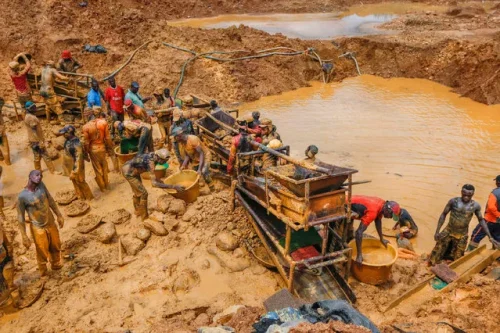Felix Kwakye Ofosu, Minister of State for Government Communications, has traced Ghana’s illegal mining crisis from its modest origins to its current status as a heavily financed criminal enterprise, warning that no government official involved will escape accountability.
Speaking on TV3’s KeyPoints program, the Abura Asebu Kwamankese legislator outlined how galamsey evolved from small scale survival activity into an organized threat to Ghana’s environment and security.
“In the past, young people used pickaxes to dig for survival. It wasn’t harmful at the scale it is today,” he explained. “Over time, some greedy and selfish individuals invested heavily, recruited people, and armed them.”
The minister has previously stated that government officials found involved in illegal mining will be immediately dismissed and prosecuted, reinforcing the administration’s zero tolerance stance toward official complicity.
Mr. Kwakye Ofosu revealed that by the time the Mahama administration assumed office in January 2025, armed groups and foreign nationals had seized control of several forest reserves. “Before this government came to power, nine forest reserves were under the control of armed bandits and terrorists,” he stated. “Those have now been taken back.”
The minister pointed to what he described as a pattern of neglect by previous administrations, referencing the Professor Frimpong Boateng report which disclosed that some NPP officials hired Chinese nationals to engage in galamsey on their behalf. The report surfaced in January 2024 when Professor Frimpong Boateng handed it over to investigators.
“Even the report that exposed officials’ involvement was hidden until it leaked before the 2024 elections,” Mr. Kwakye Ofosu said, suggesting systematic cover ups in previous years.
The Attorney General has since directed the Economic and Organised Crime Office to investigate the 36 page illegal mining report compiled by the former Environment Minister, signaling the current government’s commitment to pursuing accountability.
The minister emphasized that the current administration has equipped security forces and the National Minerals Operations, known as NIMOS, to conduct operations without local interference or advance warnings that previously compromised enforcement efforts.
“Today, NIMOS operates quietly to prevent tip offs. They have mapped out all illegal mining sites and can hit multiple points within a short time,” he disclosed, describing a strategic shift toward surprise operations coordinated at the national level.
Mr. Kwakye Ofosu has rejected claims that illegal mining has worsened since President Mahama took office, arguing that such assertions need solid data rather than conjecture. He has indicated that the fight against illegal mining should be a lifelong activity, cautioning against setting arbitrary timelines that create false expectations.
“There is no guarantee that people will stop engaging in illegal mining, so Ghanaians want to see a government committed to continuous action,” he said during an earlier interview.
The evolution of galamsey from individual artisanal mining to industrial scale operations involving heavy machinery, armed protection, and international criminal networks represents one of Ghana’s most pressing environmental and security challenges. Rivers have been poisoned, forests destroyed, and communities displaced by operations that generate millions while devastating ecosystems.
The minister’s comments suggest the government views official complicity as a central obstacle to effective enforcement. When those tasked with protecting natural resources instead profit from their destruction, regulatory systems collapse and criminal enterprises flourish with impunity.
By emphasizing that no official stands above the law, Mr. Kwakye Ofosu appeared to signal a departure from what critics characterized as selective enforcement under previous administrations. Whether this rhetoric translates into prosecutions of high ranking officials remains to be seen.
The government has not ruled out declaring a state of emergency to tackle illegal mining, though officials say existing measures are showing results. The recapture of forest reserves from armed groups, if accurate, would represent significant progress in restoring state control over protected areas.
The challenge facing Ghana extends beyond enforcement to address the economic desperation that drives many into illegal mining. Without viable alternative livelihoods in mining communities, demand for galamsey opportunities will persist regardless of crackdowns.
Mr. Kwakye Ofosu’s historical framing acknowledged this complexity, distinguishing between subsistence miners of the past and the organized criminal syndicates that now dominate the sector. Effective solutions will need to separate small scale operators seeking survival from those running industrial illegal operations backed by heavy financing and political protection.
As Ghana grapples with poisoned water bodies, degraded farmland, and international pressure to restore environmental standards, the minister’s promise that officials will face consequences if implicated carries significant weight. The test will be whether investigations lead to actual prosecutions that demonstrate equal application of the law.
For now, the government appears to be betting that improved operational security, surprise raids, and a willingness to hold officials accountable can turn the tide against an illegal mining industry that has grown more destructive with each passing year.
Source: newsghana.com.gh











